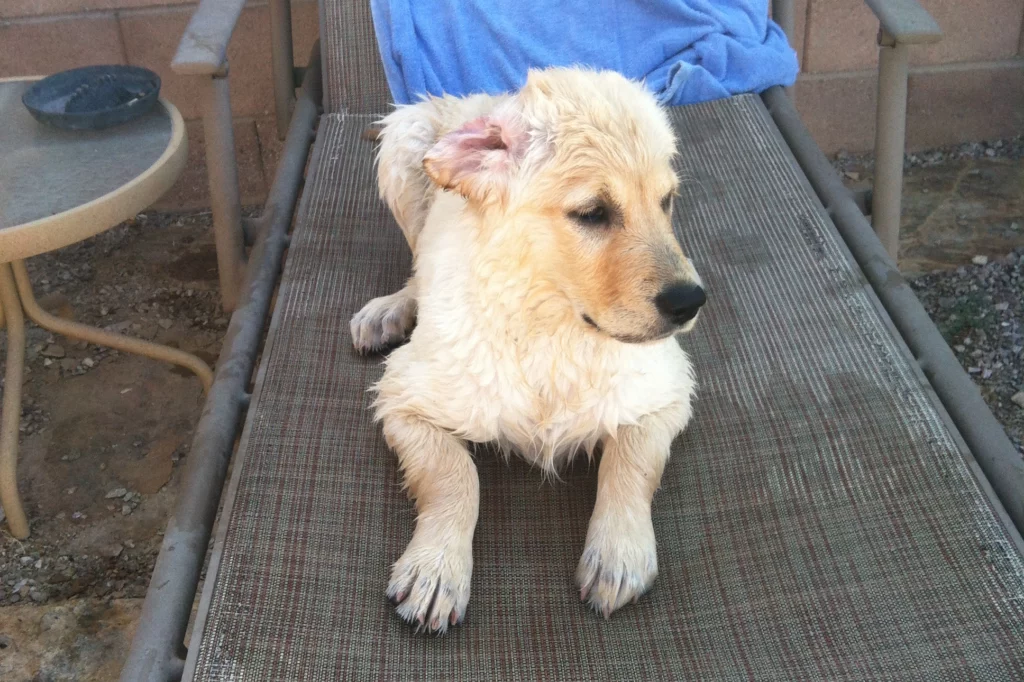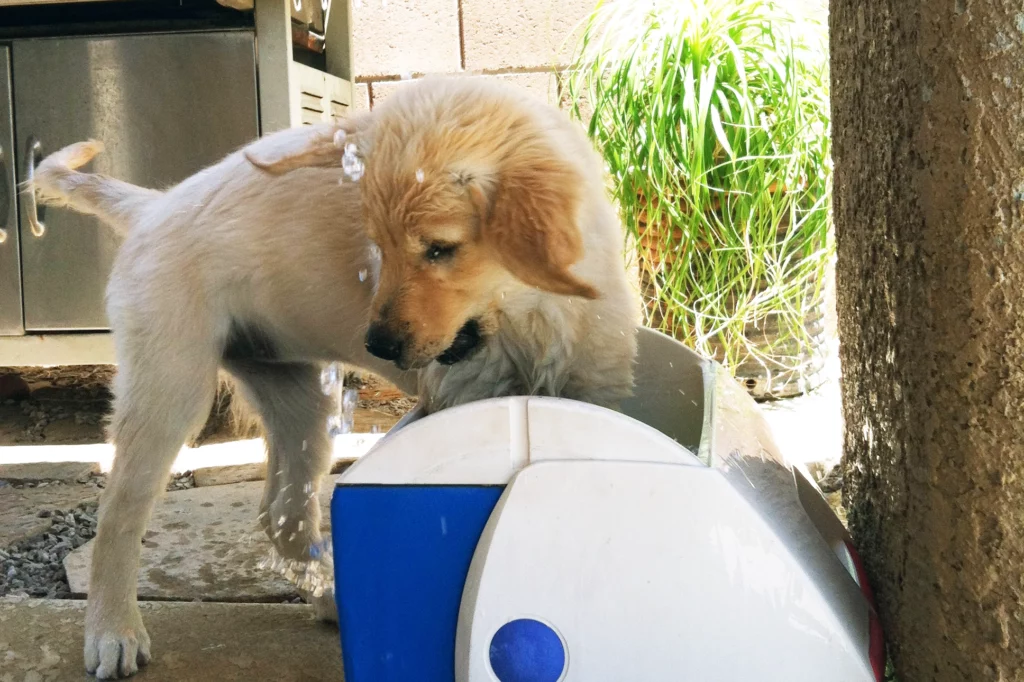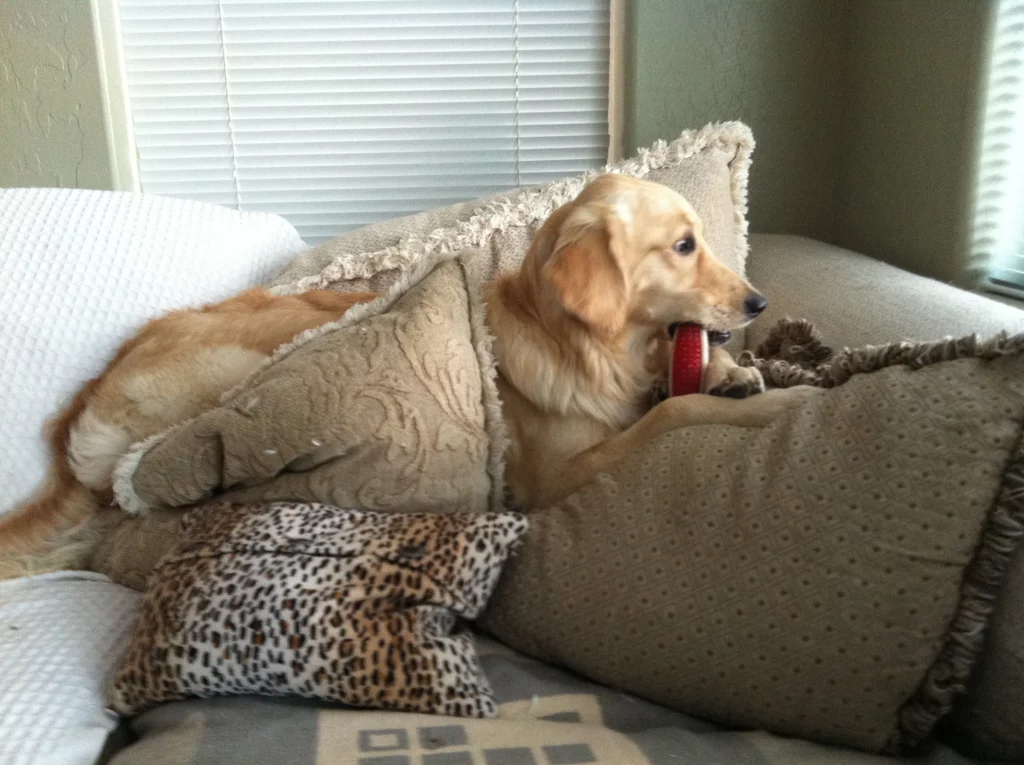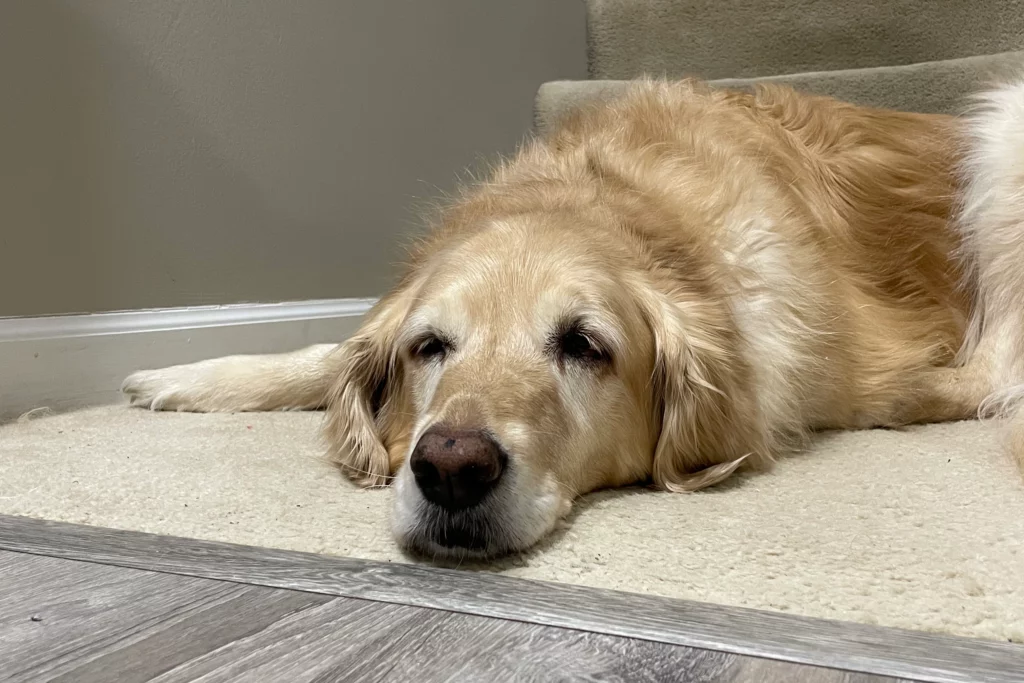This post may contain ads and affiliate links and we may earn a small commission when you click on the links at no additional cost to you. As an Amazon Affiliate, we earn from qualifying purchases. You can read our full disclaimer here.
When Do Golden Retrievers Calm Down? Navigating Energy Guide

“When do Golden Retrievers calm down?” is a question that many new and prospective Golden Retriever owners might ask.
As one of the most popular and beloved dog breeds worldwide, these friendly, gentle, and intelligent types of dog make wonderful family pets and devoted companions.
Their eagerness to please makes them a joy to train and a delight to be around.
But what about their crazy puppy antics that seem like they will never end?
When Do Golden Retrievers Calm Down? Managing Energy Levels
Understanding and managing your Golden Retriever’s energy levels is crucial for maintaining a happy, well-adjusted pup.
These energetic canines are full of enthusiasm, especially during their younger years.

By getting to know their unique energy levels, you can create a harmonious bond. This ensures a lifetime of love and companionship with your furry friend.
Are Golden Retrievers High Energy?
Yes, Golden Retrievers are naturally energetic dogs, especially during their younger years. These playful and athletic dogs love to be active. Whether it’s a game of fetch, a walk around the neighborhood, or a hike, practically any activity makes them happy.
With their boundless energy, Goldens can keep their families entertained and on their toes.
However, it’s important to remember that each dog is unique, and energy levels can vary among individual Golden Retrievers.
No products found.
No products found.
Hyper Golden Retriever: The Puppy Phase
During the puppy phase, Golden Retrievers can be particularly hyper and energetic. If you’ve ever encountered a Golden Retriever puppy, you know how much they love to play and explore their surroundings.
What to expect during this adorable, yet sometimes challenging, phase:
- Zoomies: Golden puppies are known for their bouts of “zoomies.” They race around at top speed, often in circles or figure eights.
- Playful Biting: Expect some playful biting as your Golden puppy explores the world around them using their mouth.
- Destructive Behavior: It’s not uncommon for hyper Golden puppies to chew on furniture, shoes, and other household items.
Factors Influencing Golden Retriever Energy Levels
While Golden Retrievers are generally high-energy dogs, several factors can influence their individual energy levels. Here’s a brief rundown:
- Age: As Golden Retrievers age, their energy levels typically decrease. Puppies and adolescents tend to be the most energetic, while adult and senior dogs tend to be calmer.
- Genetics: A dog’s energy level can be influenced by its genetic makeup. Some Golden Retrievers may inherit a more relaxed demeanor, while others may be naturally more energetic.
- Health: A dog’s health can impact its energy levels. Healthy dogs usually have more energy, while dogs with health issues might be less active.
- Training and Socialization: Proper training and socialization can help manage a dog’s energy level. A well-trained and socialized dog may be better able to control their excitement and energy.
By understanding these factors, you can better manage and appreciate your Golden Retriever’s unique energy levels. You’ll have a happy and well-balanced pup.
When Do Golden Retriever Puppies Mellow Out and Calm Down?
Typical Timeline for Calming Down
Golden Retriever puppies are known for their high-energy antics. But the good news is, they do eventually calm down. First, for short periods and then good behavior kicks in.

Most Golden Retrievers start to show signs of calming down around the age of 2 to 3 years old.
It’s important to remember that this is just a general guideline. Individual dogs may take a bit more or less time to mature and settle into a calmer demeanor.
Factors Affecting Individual Puppies’ Energy Levels
Several factors can influence when a Golden Retriever puppy begins to calm down.
Understanding these physical and mental factors can help you anticipate your puppy’s development and energy levels better:
- Temperament: Each Golden Retriever has its unique temperament, which can affect when and how much they calm down. Some puppies may naturally be more relaxed, while others might remain more energetic even as they age.
- Physical Activity: Regular physical activity is crucial for helping Golden Retriever puppies burn off their excess energy. Puppies that receive consistent exercise tend to calm down sooner than those who don’t get enough activity.
- Mental Stimulation: Mental stimulation, such as puzzle toys and training, can also help tire out your energetic puppy. Providing mental challenges for your puppy can help them stay engaged and focused. Consequently, this makes them less likely to act out with hyperactivity.
- Training: Consistent, positive training from an early age can help teach your Golden Retriever self-control and good manners. This leads to a calmer demeanor over time.
Be aware of factors that influence your puppy’s daily routine. Incorporate them into your puppy’s routine. This will help your Golden Retriever mature into a calm, well-behaved adult dog.
At What Stage of Life Do Golden Retrievers Calm Down and Relax a Little?
The Maturation Process and Its Effect on Energy Levels
As Golden Retrievers mature, their energy levels naturally begin to decrease. Most Goldens start to calm from their adolescent phase to adulthood around 2 to 3 years of age. This is a gradual process.
During this time, you may observe a decrease in hyperactivity in your dog. At the same time, you may see an increase in focus and self-control. This is because your dog is now able to better manage its energy levels.
The Worst Age for Golden Retrievers: Challenges During Adolescence
Adolescence, which usually occurs between 6 months and 2 years of age, can be considered the “worst age” for Golden Retrievers in terms of pent-up energy and behavior.
During this phase, your dog’s hormones and energy levels are fluctuating, making them more prone to testing boundaries and acting out.
Common challenges faced by Golden Retriever owners during adolescence include:
- Increased stubbornness and selective listening
- Excessive chewing and destructive behavior
- High-energy play that may be difficult to manage
Despite these challenges, it’s important to stay patient and consistent with your training and exercise routines, as this phase is a normal part of your dog’s development.
Individual Variation in the Timeline to Calm Down
While most Golden Retrievers begin to calm down around 2 to 3 years of age, it’s important to remember that every dog is unique, and some may take longer to mature.
Factors such as genetics, environment, and upbringing can all play a role in your dog’s individual timeline for calming down.
Stay patient with your Golden Retriever. Provide consistent training and exercise. This will help them reach their full potential. They will become a calm and well-behaved adult dog.
Are Golden Retrievers Calm?
Exploring the Adult Golden Retriever’s Temperament
Once Golden Retrievers have matured and passed through their high-energy puppy and adolescent phases, they generally develop a calmer, more even-tempered demeanor.

Adult Golden Retrievers are known for their friendly and gentle nature, making them excellent companions for families, seniors, and individuals alike.
They still maintain an enthusiastic and playful attitude. But they are better able to manage their energy levels, making them more predictable and easygoing.
Factors Contributing to a Calm and Well-Behaved Golden Retriever
Several factors contribute to the development of a calm and well-behaved Golden Retriever. By understanding and addressing these factors, you can help your dog reach their full potential:
- Training your Golden Retriever should be consistent and positive. Reinforcement-based training from an early age can help teach self-control and good manners. This leads to a calmer demeanor over time.
- Regular Exercise: Ensuring your Golden Retriever receives adequate daily exercise will help burn off excess energy, making them more relaxed and content.
- Mental stimulation is important for dogs. Puzzle toys, training and interactive games can help keep them engaged and prevent boredom. If a dog is bored, it can lead to hyperactivity.
- Socializing your Golden Retriever can help them become more confident and adaptable. This makes them better able to stay calm in different situations. Introduce them to various environments, people, and animals from a young age to ensure they have the best start.
- Creating a daily routine for your dog can help promote a calmer demeanor. This routine should include regular feeding times, walks, and training sessions. This structure can provide your dog with a sense of stability and security.
Address these factors and maintain a nurturing, supportive environment. This will give your Golden Retriever the best chance to develop into a calm, well-behaved, and happy adult dog.
How to Calm Down a Golden Retriever
Chill Out Tips for Your Hyper Golden Retriever
Do you have a hyper Golden? No worries! Try these tips to help them relax:
- Create a “calm zone”: Set up a cozy, quiet space for your dog to unwind.
- Use calming aids: Try calming sprays, diffusers, or calming treats to help your pup relax.
- Massage time: Gently massaging your Golden can help release tension and promote relaxation.
- Keep it low-key: Dim the lights, play soft music, or use white noise to create a soothing atmosphere.
Physical Exercise and Mental Stimulation: A Golden Recipe
Physical exercise and mental stimulation are super important to keep your Golden Retriever happy and calm. Here’s why:
- Exercise burns off energy: A tired dog is more likely to be calm and relaxed.
- Mental stimulation prevents boredom: Engaged dogs are less likely to act out or become hyperactive.
Training Techniques for a Calmer Pooch
Do you want a Calmer Golden? Try These Training Techniques
- Reward calm behavior: Praise and reward your dog when they’re calm and well-behaved.
- Teach “settle” or “relax”: Train your dog to lie down and relax on command.
- Practice impulse control: Teach your dog to wait patiently for treats, toys, and attention.
Remember, patience and consistency are key to helping your Golden Retriever become a calmer, happier companion. You can do it!
Final Thoughts and Conclusion of “When do Golden Retrievers Calm Down”
Having a well-behaved Golden Retriever is super rewarding. As your dog grows up and calms down, you’ll have a loving, loyal buddy who makes your life happier.
Spending time on your Golden’s training, play, and brain games will help build a strong, lasting bond between you two.
Being Patient and Understanding While Your Dog Grows
It’s important to be patient and understanding as your Golden Retriever grows. Every dog is different, so their energy and time to calm down can vary.
Keep up with training, exercise, and fun activities to help your dog be the best they can be.
Enjoy every moment with your Golden Retriever as they grow into a well-behaved, relaxed, and loving friend.
-

Coffee Mug – In Dog Coffees I’ve Only Had One
Price range: $11.95 through $14.95 Select options This product has multiple variants. The options may be chosen on the product page
